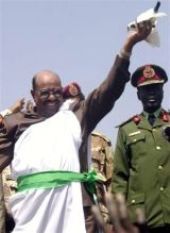A peace deal for Sudan brings opportunity for freedom and oil prosperity
By CHRIS TOMLINSON, Associated Press Writer
NAIROBI, Kenya, Jan 11, 2005 (AP) — An agreement to end two decades of civil war in Sudan not only brings the opportunity for millions of people to return home and begin new lives, it also gives investors an opening in a needy country with large oil reserves.

|
|
Sudanese President Omar Al-Bashir holds aloft a bird symbolizing peace at a rally in Juba, Sudan Monday, Jan. 10, 2005. (AP). |
Experts predict that oil and gas companies will rush in to expand Sudan’s oil production from the 345,000 barrels a day recorded in June 2004. The country has proven reserves of 635 million barrels, much of which could not be accessed during the war because of fighting.
Under the peace agreement signed Sunday, oil leases signed by the government during the war will be respected. The largest lease holders include the China National Petroleum Company, Malaysia’s Petronas, ONGC Videsh Limited of India and Sudan’s Sudapet.
That doesn’t mean there aren’t still many opportunities
French oil giant Total announced in late December that the company had renewed oil agreements with Sudan that were abandoned in 1985 because of the war. Sudan’s energy ministry also announced that oil production will increase to 500,000 barrels a day.
The United States has enforced sanctions against Sudan for being a state sponsor of terrorism, but in the run-up to the peace agreement, U.S. Secretary of State Colin Powell promised that an end to fighting in southern Sudan would speed up the normalization of relations.
The U.S. government has also made it easier for major companies to get exemptions from the sanctions.
The southern accord does not apply to the fighting in Darfur, a vast western region where tens of thousands of people have died in an almost 2-year-old conflict, pitting rebels against government forces and allied Arab militias, known as the Janjaweed.
U.S. oil companies have recently begun to show interest in Sudan’s undeveloped oil fields.
Houston-based Marathon Oil recently received permission from the U.S. government to sign a revised exploration and production sharing agreement with the Sudanese government related to interests held since 1983 with Total, Kuwait-based Kufpec and Sudan’s national petroleum company, Marathon spokesman Paul Weeditz said Tuesday.
He said the U.S. license does not allow it to begin work in Sudan yet, but the Sudanese agreement protects the company’s interests should it decide to do so in the future.
Duncan Bonnett, a partner at the consulting firm Whitehouse and Assoc. in Johannesburg, South Africa, said many international companies had already sent teams to Sudan’s capital, Khartoum, to investigate opportunities not only in the oil and gas sector, but in agriculture, construction, engineering and other services.
“From an export point of view, machinery and equipment supply, recreating the concrete industry and rehabilitating industries that already exist, and taking advantage of the agro-industry side, will” present significant opportunities, said Bonnett, who specializes in emerging markets.
South African companies, many with experience working in countries emerging from conflicts such as Mozambique, Angola and Congo, are aggressively moving into Sudan, he said. A trade fair in Khartoum attracted more than 500 companies from 15 countries, ranging from a French yeast firm to a Spanish company offering ceramic tiles.
“Sudan is going to be number one in Africa and the world for investment because it’s a large country and the infrastructure is zero,” said Tajeldin Awad, director of Spanish firm Emigres’ Sudan operation. “People need buildings, power, highways, hospitals — they need everything.”
The government instituted dramatic economic reforms in 1998 and in 2004 registered a 7.5 percent growth in gross domestic product. But inflation topped 8 percent in 2004 and Sudan’s 38 million people averaged only $1,900 a year in income, high by African standards but low compared to most oil producing countries.
Agriculture made up 38 percent of Sudan’s GDP in 2003 and employed 80 percent of the country’s workers in cotton, sesame, livestock, groundnut, gum arabic and sugar production. In 2003 the country attracted $1 billion in foreign direct investment, said Nasser Hashim, an official at the Ministry of Investment, and that number is expected to climb.
But there are many uncertainties and difficulties ahead. Southern Sudan has seen virtually no development since the 1950s, and more than 4 million southern Sudanese fled their homes during the war. And the peace accord allows the southern Sudanese to hold a referendum on independence in six years, setting up the possibility of more conflict with the north.
Phil Heilberg, founder of New York-based Heilberg Management Group, said he encountered massive incompetence, unreasonable expectations and political infighting when he agreed to help the rebels in their business dealings in 2003. After a $100 million deal fell apart because the rebels wanted to renegotiate the contract at the last minute, he gave up.
“They really have very little experience dealing with the international community,” he said. “This is a very complex situation here, then when you complicate it with the people who are involved now, it is virtually impossible to solve.”
